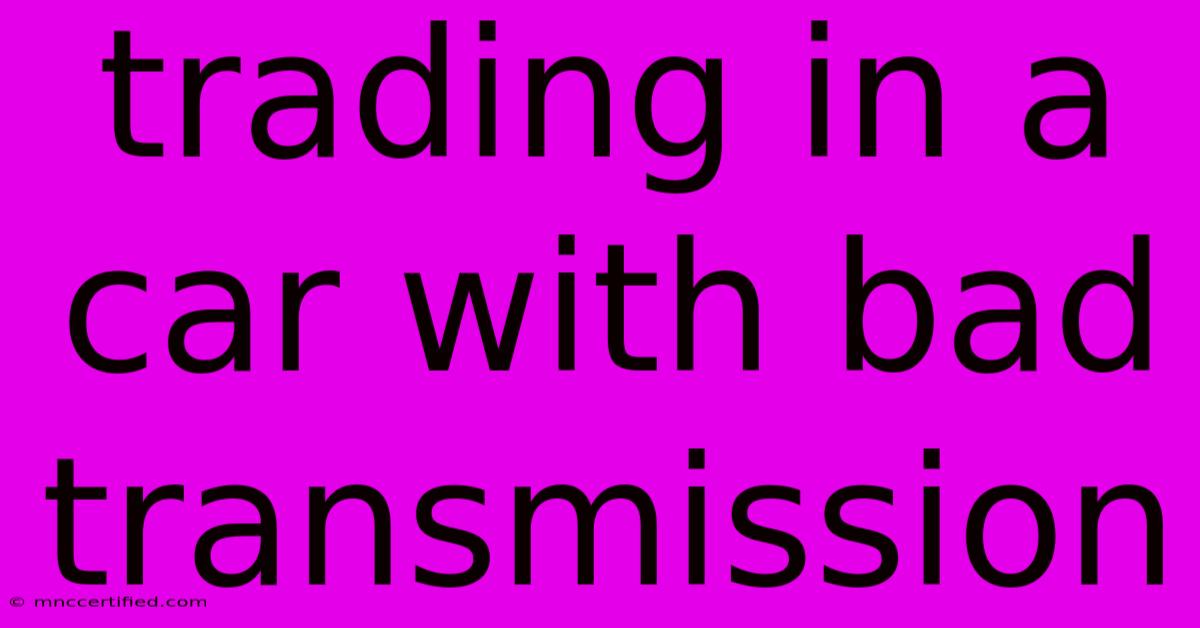Trading In A Car With Bad Transmission

Table of Contents
Trading in a Car with a Bad Transmission: What You Need to Know
You've got a car with a bad transmission, and you're looking to trade it in. It's a common situation, but the question is: can you trade in a car with a bad transmission? The answer is a resounding yes, but it comes with some caveats.
This article will guide you through the process of trading in a car with a bad transmission, explaining the various factors that influence the value of your trade-in, and providing you with tips on getting the best deal.
Understanding the Impact of a Bad Transmission on Your Trade-in Value
A faulty transmission significantly affects the value of your car. Dealerships recognize that repairing a transmission can be expensive, ranging from a few hundred dollars to thousands, depending on the car's make and model.
Here's how a bad transmission affects your trade-in:
- Reduced Value: The most obvious impact is a significant decrease in your car's value. Dealerships will typically offer a much lower price than they would for a car with a working transmission.
- Potential for Repair: If the transmission issue is minor and the dealership believes it's repairable at a reasonable cost, they might be willing to offer a slightly higher price. However, they'll likely factor in the repair cost into their offer.
- Complete Write-off: In severe cases, where the transmission damage is extensive, the dealership might deem the car a total loss and offer a minimal trade-in value, sometimes only scrap value.
Factors Affecting Your Trade-in Value
Several factors influence the price a dealership will offer for your car with a bad transmission:
- Car Make and Model: Newer, high-demand cars tend to retain more value, even with a bad transmission. Older, less sought-after vehicles will receive lower offers.
- Overall Condition: The car's condition, beyond the transmission issue, plays a role. A clean interior, well-maintained exterior, and good overall condition will increase your trade-in value.
- Market Demand: The overall demand for the specific car model can affect the trade-in price. If there's a high demand for the model, even with a bad transmission, you might receive a slightly better offer.
- Dealership's Needs: Dealerships have specific needs and might be more willing to accept a car with a bad transmission if it fits their inventory requirements.
Tips for Maximizing Your Trade-in Value
While a bad transmission lowers your trade-in value, you can still maximize your offer by following these tips:
- Research the Market: Check online resources like Kelley Blue Book and Edmunds to determine the average trade-in value of your car in good condition. This will give you a baseline to compare against the dealership's offer.
- Be Honest and Transparent: Disclose the transmission problem upfront to the dealership. This builds trust and helps them assess the situation accurately.
- Get Multiple Quotes: Visit several dealerships and compare their offers. Each dealership might value your car differently, so don't settle for the first offer.
- Consider Selling Privately: You might be able to get a higher price by selling your car privately. However, be prepared to deal with potential buyers and haggling.
- Explore Trade-In Alternatives: Some dealerships offer programs where you can trade in your vehicle for a down payment on a new car, even with significant issues.
Conclusion: Trading in a car with a bad transmission can be challenging, but it's not impossible. By understanding the factors affecting your trade-in value and employing the right strategies, you can increase your chances of getting the best possible offer.

Thank you for visiting our website wich cover about Trading In A Car With Bad Transmission. We hope the information provided has been useful to you. Feel free to contact us if you have any questions or need further assistance. See you next time and dont miss to bookmark.
Featured Posts
-
Putin Trump Victory Courageous Ready For Dialogue
Nov 09, 2024
-
British Insurance Giant Crossword Clue
Nov 09, 2024
-
Difference Between Bonding And Veneers
Nov 09, 2024
-
Homeowners Insurance Palm Beach County
Nov 09, 2024
-
Florida Combined Life Dental Insurance
Nov 09, 2024